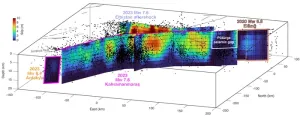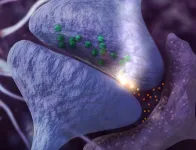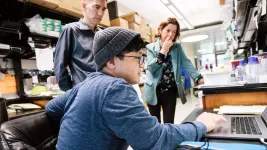(Press-News.org) (Toronto, April 20, 2023) Storing donor lungs for transplant at 10 degrees Celsius markedly increases the length of time the organ can live outside the body according to research led by a team of scientists at the Toronto Lung Transplant Program in the Ajmera Transplant Centre at the University Health Network (UHN).
The prospective multicenter, nonrandomized clinical trial study of 70 patients demonstrated that donor lungs remained healthy and viable for transplant up to four times longer compared to storage at the current standard of ice cooler preservation of around 4 degrees Celsius.
“The clinical impact of this study is huge. It’s a paradigm shift for the practice of lung transplant.”, says lead author Dr. Marcelo Cypel, Surgical Director of the Ajmera Transplant Centre and a surgeon within the Sprott Department of Surgery at UHN.
“I have no doubt that this will become the gold standard practice of lung preservation for the foreseeable future.”
Lungs available for transplant are currently limited by the length of time a donor organ can be kept viable. Increasing storage time allows for viable donor lungs to come from greater distances, increasing the potential for greater numbers of lungs becoming available for transplant and overcoming many of the hurdles around transplant logistics.
“In transplant, we still see a critical shortage of organs and people dying on the waitlist because there are not enough lungs to be transplanted.”, says Dr. Cypel, who is also a Professor in the Division of Thoracic Surgery, Department of Surgery at U of T.
“It’s a great accomplishment to see that our research is now having an impact, and that we can actually have more cases done at our centre, with continued outstanding clinical results. Better organ preservation also means better outcomes for patients.”
Results of the trial were published today in the New England Journal of Medicine Evidence: https://doi.org/10.1056/EVIDoa2300008
The trial took place over 18 months at UHN’s Toronto General Hospital, the Medical University of Vienna, and Hospital Universitario Puerta de Hierro-Majadahonda in Madrid.
"The ability to extend the lifespan of the donor organ poses several advantages. Ultimately, these advantages will allow for more lungs to be utilized across farther geographies and the ability to improve recipient outcomes by converting lung transplantation into a planned rather than urgent procedure.”, says study first author Dr. Aadil Ali, Adjunct Scientist at the Toronto General Hospital Research Institute.
Some advantages of this new 10 degrees Celsius standard for lung storage include the potential to reduce or eliminate the 24/7 schedule and urgency of lung transplant procedures. By increasing the length of time donor lungs are viable, transplant surgeries could become planned procedures, which avoids bumping scheduled surgeries and overnight transplantation. This advancement on practice comes at a critical time when hospital resources are stretched and there are increased surgical backlogs due to the pandemic.
The study also suggests the new preservation temperature will allow more time to optimize immunologic matching between donor and recipients, and the possibility of performing lung transplantation in a semi-elective rather than urgent fashion.
For more on the study watch Dr. Cypel's presentation of findings at a recent American Association for Thoracic Surgery event: 165. Extending… | The American Association for Thoracic Surgery | AATS.
Also, watch a video with Drs. Cypel and Ali discussing the foundational work that led to this breakthrough: The Future Now: Two Studies Offer a Sneak Peek into the Future of Organ Transplantation - YouTube.
The UHN-led international study was funded by the UHN Foundation.
Clinicaltrials.gov number, NCT04616365
About University Health Network
University Health Network consists of Toronto General and Toronto Western Hospitals, the Princess Margaret Cancer Centre, Toronto Rehabilitation Institute, and The Michener Institute of Education at UHN. The scope of research and complexity of cases at University Health Network has made it a national and international source for discovery, education and patient care. It has the largest hospital-based research program in Canada, with major research in cardiology, transplantation, neurosciences, oncology, surgical innovation, infectious diseases, genomic medicine and rehabilitation medicine. University Health Network is a research hospital affiliated with the University of Toronto. For more information: https://www.uhn.ca/
Media Contacts:
Christian Cote’ Christian.cote@uhn.ca
Catherine Danko Catherine.danko@uhn.ca
About UHN Foundation
Part of University Health Network (UHN), UHN Foundation raises funds for research, education and the enhancement of patient care at Toronto General and Toronto Western hospitals, Toronto Rehab and The Michener Institute of Education at UHN. With donor support, UHN Foundation is helping UHN pursue new knowledge to build a healthier world. For further information:
Media contact: Lisa Arai, Director, Brand Marketing, UHN Foundation, 416-278-6737, lisa.arai@uhn.ca
- 30 -
END
UHN Researchers publish ground breaking clinical trial in lung transplantation
Paradigm shift in lung preservation could increase donor organs and change practice worldwide
2023-04-20
ELSE PRESS RELEASES FROM THIS DATE:
Turkey’s next quake: USC research shows where, how bad — but not ‘when’
2023-04-20
Researchers know a lot about Turkey’s next major earthquake. They can pinpoint the probable epicenter, estimate its strength and see the spatial footprint of where damage is most likely to occur.
They just can’t say when it will happen.
That’s the main takeaway from a new USC-led study that appears today (April 20) in Seismica.
Using remote sensing, USC geophysicist Sylvain Barbot and his fellow researchers documented the massive Feb. 6 quake that killed more than 50,000 people in Eastern Turkey and toppled more than 100,000 buildings.
Alarmingly, researchers found that a section of the fault remains unbroken and locked – a sign that the plates there ...
Astrocyte dysfunction causes cognitive decline
2023-04-20
People with dementia have protein build-up in astrocytes that may trigger abnormal antiviral activity and memory loss, according to a preclinical study by a team of Weill Cornell Medicine investigators.
Dysfunction in cells called neurons, which transmit messages throughout the brain, has long been the prime suspect in dementia-related cognitive deficits. But a new study, published in Science Advances on April 19, suggests that abnormal immune activity in non-neuronal brain cells called astrocytes is sufficient to cause cognitive deficits in dementia. The discovery could lead to new treatments that reduce excess immune activity in astrocytes and their detrimental effects on other brain ...
UC Irvine biologists discover bees to be brew masters of the insect world
2023-04-20
Irvine, Calif., April 20, 2023 — Scientists at the University of California, Irvine have made a remarkable discovery about cellophane bees – their microbiomes are some of the most fermentative known from the insect world. These bees, which are named for their use of cellophane-like materials to line their subterranean nests, are known for their fascinating behaviors and their important ecological roles as pollinators. Now, researchers have uncovered another aspect of their biology that makes them even more intriguing.
According to a study published in Frontiers in Microbiology, cellophane ...
Sugar rush: scientists discover key role of glucose in brain activity
2023-04-20
SAN FRANCISCO, CA—April 18, 2023—The human brain has a sweet tooth, burning through nearly one quarter of the body’s sugar energy, or glucose, each day. Now, researchers at Gladstone Institutes and UC San Francisco (UCSF) have shed new light on exactly how neurons—the cells that send electrical signals through the brain—consume and metabolize glucose, as well as how these cells adapt to glucose shortages.
Previously, scientists had suspected that much of the glucose used by the brain was metabolized by other brain cells called ...
New study finds shifting climate regions leading to hotter, drier conditions across Kenya
2023-04-20
ST. LOUIS – Research published in Regional Environmental Change has shown that as climate zones shift toward hotter and drier conditions, ecological diversity will decline, posing a major threat to terrestrial ecosystems with far-reaching social and ecological impacts.
The study, “Shifting climate zones and expanding tropical and arid climate regions across Kenya (1980-2020),” was published online on April 5.
The research team analyzed Kenya's geographic distribution and arrangement of ...
Using solar farms to generate fresh desert soil crust
2023-04-20
In the arid regions of the American Southwest, an unseen world lies beneath our feet. Biocrusts, or biological soil crusts, are communities of living organisms. These industrious microbes include cyanobacteria, green algae, fungi, lichens, and mosses, forming a thin layer on the surface of soils in arid and semi-arid ecosystems.
Biocrusts play a crucial role in maintaining soil health and ecosystem sustainability, but they are currently under assault. Human activities including agriculture, urbanization, and off-road ...
COVID-19 pandemic saw major increase in children and adolescents attempting suicide by poison, study finds
2023-04-20
The rate of suspected suicide attempts by poisoning among children and adolescents ages 10-19 reported to U.S. poison centers increased 30% during 2021 – the COVID-19 pandemic’s first full year – compared with 2019, a new UVA Health study found.
The rate of suspected suicide attempts by poisoning among children ages 10-12 increased 73% during 2021 compared with 2019. Among adolescents ages 13-15, the rate of suspected suicide attempts by poisoning increased 48.8% in 2021 versus 2019. The rate of suspected suicide attempts by poisoning among females ages 10-19 increased 36.8% in 2021 compared with 2019.
The findings ...
Pairing up: the impact of treating alcohol use disorder and PTSD together
2023-04-20
A collaborative multi-site randomized controlled trial at the University of Houston and the Medical University of South Carolina is set to prove the effectiveness of treating alcohol use disorder (AUD) and posttraumatic stress disorder (PTSD) together.
It’s a one-two punch whose time has come. No integrative treatment combining Cognitive processing therapy (CPT) for PTSD and relapse prevention (RP) for AUD currently exists.
“A substantial proportion of individuals with AUD also meet criteria for PTSD. The co-occurrence of AUD/PTSD is characterized by more severe symptomatology, greater functional impairment, ...
IU cancer researchers identify new target for breast cancer therapy
2023-04-20
INDIANAPOLIS—While trying to understand what initiates breast cells to become cancerous, researchers at the Vera Bradley Foundation Center for Breast Cancer Research at Indiana University Melvin and Bren Simon Comprehensive Cancer Center have identified a new target for breast cancer treatment.
“When comparing healthy breast tissue and cancerous cells, we wanted to find out what is the earliest genomic change that happens to initiate the cancer,” said Harikrishna Nakshatri, PhD, the Marian J. Morrison professor of breast cancer research ...
Hungry eyes: Spiders lose vision when they're starving
2023-04-20
Biologists at the University of Cincinnati discovered that underfed jumping spiders lose light-sensitive cells that are key to their vision.
UC College of Arts and Sciences Professor Elke Buschbeck and her co-authors studied photoreceptors in the eyes of bold jumping spiders, tiny eight-legged predators found across North America. The little hunters rely on their keen vision to stalk prey.
But researchers found that underfed spiders begin to lose photoreceptors that give them such good eyesight. Their findings could improve our understanding of ...
LAST 30 PRESS RELEASES:
Cal Poly’s fifth Climate Solutions Now conference to take place Feb. 23-27
Mask-wearing during COVID-19 linked to reduced air pollution–triggered heart attack risk in Japan
Achieving cross-coupling reactions of fatty amide reduction radicals via iridium-photorelay catalysis and other strategies
Shorter may be sweeter: Study finds 15-second health ads can curb junk food cravings
Family relationships identified in Stone Age graves on Gotland
Effectiveness of exercise to ease osteoarthritis symptoms likely minimal and transient
Cost of copper must rise double to meet basic copper needs
A gel for wounds that won’t heal
Iron, carbon, and the art of toxic cleanup
Organic soil amendments work together to help sandy soils hold water longer, study finds
Hidden carbon in mangrove soils may play a larger role in climate regulation than previously thought
Weight-loss wonder pills prompt scrutiny of key ingredient
Nonprofit leader Diane Dodge to receive 2026 Penn Nursing Renfield Foundation Award for Global Women’s Health
Maternal smoking during pregnancy may be linked to higher blood pressure in children, NIH study finds
New Lund model aims to shorten the path to life-saving cell and gene therapies
Researchers create ultra-stretchable, liquid-repellent materials via laser ablation
Combining AI with OCT shows potential for detecting lipid-rich plaques in coronary arteries
SeaCast revolutionizes Mediterranean Sea forecasting with AI-powered speed and accuracy
JMIR Publications’ JMIR Bioinformatics and Biotechnology invites submissions on Bridging Data, AI, and Innovation to Transform Health
Honey bees navigate more precisely than previously thought
Air pollution may directly contribute to Alzheimer’s disease
Study finds early imaging after pediatric UTIs may do more harm than good
UC San Diego Health joins national research for maternal-fetal care
New biomarker predicts chemotherapy response in triple-negative breast cancer
Treatment algorithms featured in Brain Trauma Foundation’s update of guidelines for care of patients with penetrating traumatic brain injury
Over 40% of musicians experience tinnitus; hearing loss and hyperacusis also significantly elevated
Artificial intelligence predicts colorectal cancer risk in ulcerative colitis patients
Mayo Clinic installs first magnetic nanoparticle hyperthermia system for cancer research in the US
Calibr-Skaggs and Kainomyx launch collaboration to pioneer novel malaria treatments
JAX-NYSCF Collaborative and GSK announce collaboration to advance translational models for neurodegenerative disease research
[Press-News.org] UHN Researchers publish ground breaking clinical trial in lung transplantationParadigm shift in lung preservation could increase donor organs and change practice worldwide





